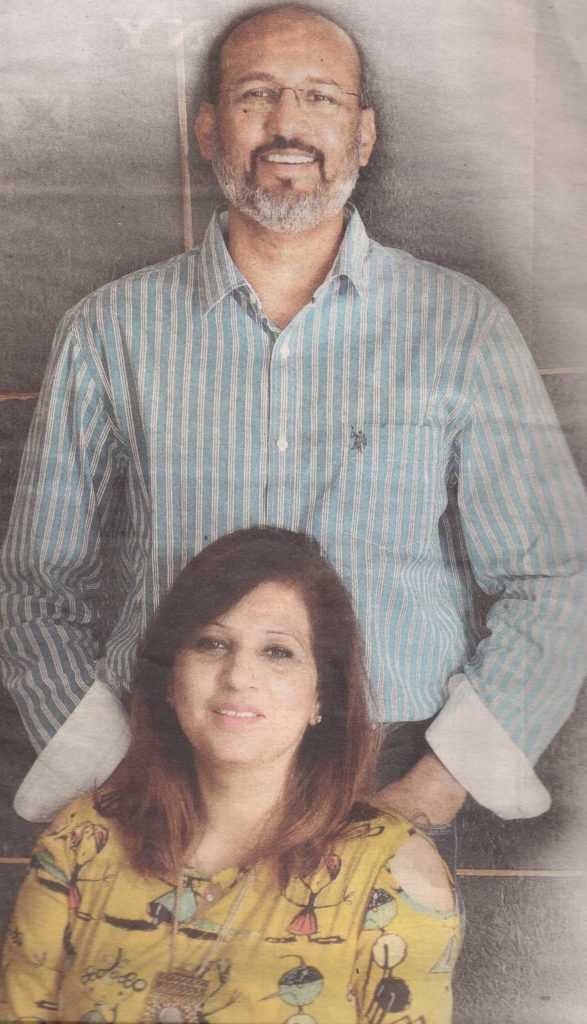The siblings have recently set up a performance space and library to bridge the gap between the art community across the city.
One of the things that deeply concerned Aiman Mehta, a former journalist and real estate professional, was that there were few spaces in Kondhwawhere one could catch a play or a stand-up comedy performance or even a concert. “For any art and culture event, one needed to travel to Koregaon Park or Kalyani Nagaror the Deccan side,” says Mehta, “And there’s so much talent here that needed a platform.” A month ago, Mehta along with her brother Azhar Tambuwala, launched Raah literary and cultural centre in Lulla Nagar, on the other side of the river. Raah has been hosting spoken word poetry evenings that have drawn the biggest crowd and theatrical performances among other events.
The cheery eighth floor venue with red and yellow metal-framed chairs and vintage-themed wallpaper is instantly welcoming, with a cosy cafe space in one corner, an al fresco seating area and an indoor area that can accommodate around 50 people. A slightly raised stage is perfect for intimate performances. Attached to the venue is a small, well-lit library with nooks that invite you to curl up with a book. “While all of us try to promote art and culture in our own way, Raah was a means to organise our efforts so that more people get involved and we can do greater good,” says Tambuwala, who heads international trade and development for Sahyadri Farms, the Nashik-based farmers’ producer company working with over 8,000 farmers in Maharashtra to promote fair trade. The audience that found its way to Raah is not a result of social media posts that have gone viral, but purely word-of-mouth.
Both siblings are refreshingly old school. Besides meeting artistes, Mehta has been actively working on inviting more people to her space. “I met a senior citizens’ group recently to tell them about the place and some of them were suspicious of our intentions. They weren’t willing to believe that we weren’t making money off this venture. One of them asked me, ‘But what are you getting off this?’ That was a tough one,” she says. The venue charges an entry fee ranging between Rs 50 and Rs 200. “I’m beginning to believe that anything that is done free of cost is not appreciated,” says Mehta. Tambuwala adds, “This is a not-for-profit venture and we’re never going to look at it as a source of income. We are not an event management agency.”
Tambuwala has been tapping into his network of runners, artistes and intellectuals to participate in the happenings at the venue. Well-known columnist Jug Suraiya has generously donated books to Raah’s library after a chat with Tambuwala. “He promises to donate more when he empties out another room of books. He has three rooms filled with books,” says Mehta. Tambuwala remembers how important books were to their growing up years. “We were really encouraged to read as children. Books were a window to a world beyond our little world,” he says.
It was only when both of them were brought together due to a personal tragedy that they realised that they were working together towards a common goal to promote art in the city. “Our father passed away last year,” says Mehta, “I didn’t know until then that we could be a team.” The brother, younger only by two years, perfectly balances Mehta’s frenzied energy with his unflappable attitude. “I think my nervous energy works for me,” says Mehta, “But when I’m losing it and I go to Azhar, he’s completely calm and I think that helps.” Both of them also share a love for fine arts and are self-taught hobby artists. Mehta took to painting while she was a journalist in Bahrain and Tambuwala did pencil sketches while still in college. He pulls out a sketch of a woman looking at her reflection in water, which he made when he was 17 and points out jokingly that it was moth eaten, but they still decided to frame it. Tambuwala has also been an occasional storyteller on stage at Gyaan Adab Centre, and is keen that Raah too provide a platform for storytellers across the city. “We would like to host storytellers who also want to teach a craft and combine two different arts on one stage,” says Mehta. Tambuwala also wants to encourage Urdu poets to perform at Raah. “Maybe we’ll also have a Shakespeare and poetry segment,” he adds.
Besides turning it into a cultural hub, Mehta has bigger plans for Raah. “I want slum kids to gain skills that would otherwise not be available to them,” she says. Mehta hopes to engage music, dance, theatre and other performance art practitioners to fulfil this dream. “I’ve always wanted to start an NGO, but when Azhar and I started talking about setting up Raah, we realised that it was possible to do both here,” she says. Charity indeed begins at home.
To read the full article Click here.

